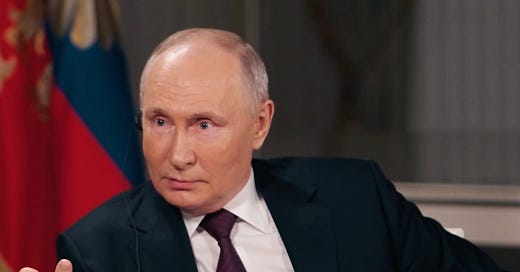On February 6, 2024, well-known U.S. political commentator Tucker Carlson conducted an interview with Russian President Vladimir Putin in Moscow. I provide in today’s commentary a review of the interview, which lasted 127 minutes.1
§
The Ukraine in Russian history
Putin began with an extended discussion of Russian history, which he declared to be the necessary foundation for a serious conversation. In Putin’s account, Russia began forming into a centralized state in the ninth century, with two centers of power, namely Kiev, the current capital of Ukraine, and Novgorod, situated between Moscow and St. Petersburg. Beginning in 988, Russia began conversion to Orthodox Christianity, which strengthened the unity of Russia into a single territory with one language and integrated economic ties. Following a period of fragmentation, common at that time in Europe, the Russian state reunified, with its center i…



